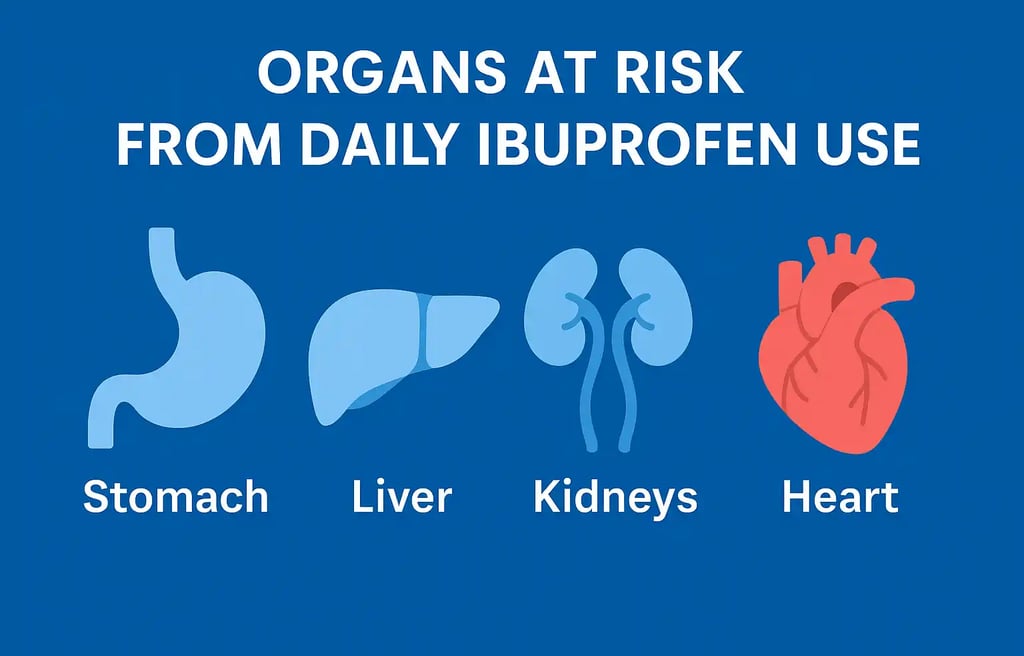Can You Take Ibuprofen Daily — and Should It Be With or Without Food?
Learn if it’s safe to take ibuprofen daily and whether to take it with or without food. Risks, safe use, and doctor advice explained clearly.


Can You Take Ibuprofen Daily — and Should It Be With or Without Food?
Ibuprofen is widely available over the counter, but taking it every day can pose health risks — especially if not used under medical supervision. Here’s what you need to know about daily use and when it becomes unsafe.
Is It Safe to Take Ibuprofen Every Day?
Taking ibuprofen daily is not recommended without a doctor’s guidance. While it’s effective at reducing inflammation and relieving pain, regular long-term use increases the risk of serious side effects, especially involving the stomach, kidneys, liver, and cardiovascular system.
If you're thinking about taking ibuprofen daily, it's important to know that regular use may increase the risk of certain side effects. Most medical guidance suggests using the lowest effective dose for the shortest time needed. If you're considering daily use, it's helpful to understand how ibuprofen compares to other over-the-counter options. These are all things you should discuss with your healthcare provider.
Potential Risks of Daily Ibuprofen Use
Stomach damage – daily ibuprofen can irritate your stomach lining, increasing the risk of ulcers, internal bleeding, or gastritis.
Kidney strain – regular use can reduce kidney function over time, especially in people with preexisting kidney problems or dehydration.
Liver stress – although less common, long-term use may cause liver damage in some individuals.
Increased heart risk – extended use may raise the chance of heart attack or stroke, especially in higher doses.
Should Ibuprofen Be Taken With or Without Food?
Whether you should take ibuprofen with food depends on your situation. Taking it on an empty stomach allows ibuprofen to be absorbed more quickly, so you may feel pain relief faster. However, ibuprofen without food also has a higher likelihood of stomach irritation, especially if ibuprofen is being used daily or at higher doses.
Most medical experts recommend taking ibuprofen with food or milk to help protect the stomach lining. This may slightly delay how quickly the medicine works — usually by just 10 to 20 minutes — but it significantly lowers the risk of stomach pain, ulcers and gastrointestinal bleeding over time.
If you only take ibuprofen occasionally, taking it on an empty stomach might not cause much trouble, but if you are using it daily, it’s generally safer to pair it with meals. Anyone with a history of stomach ulcers, acid reflux, or gastrointestinal issues should be especially cautious and always take ibuprofen with food no matter what.
FAQ
Is it OK to take one ibuprofen a day for months?
Only under medical supervision. Even low doses over long periods can raise your risk for GI or kidney issues.
How long is too long to take ibuprofen daily?
Using ibuprofen daily for more than 10 - 14 days without doctor oversight can be risky. It’s really intended for short-term relief, unless otherwise directed.
What dose is considered “safe” for daily use?
Generally, the maximum over the counter dose is 1200 mg per day (typically 200–400 mg every 4–6 hours). Any long-term dosing should be customized by your doctor.
Are there safer alternatives for daily use?
For long-term pain management, doctors may recommend acetaminophen, physical therapy, or non-NSAID prescriptions depending on your condition. But this is just informational, and you need to consult a physician to know and ensure what's best for you and your individual health.
What signs should I watch for if I’m using Ibuprofen regularly?
Be alert for symptoms like stomach pain, black stool, unusual fatigue, swelling, or changes in urination, which may signal complications.
Disclaimer
This page summarizes information from trusted medical sources and is provided for general knowledge only. lt is not medical advice; Always consult your doctor or pharmacist for personal medical guidance (For a more comprehensive explanation please see the full disclaimer).
Resources
The information above has been gathered from several reputable sources, including the following:
[1] Mayo Clinic – Ibuprofen (Oral Route)
[2] MedlinePlus – Ibuprofen
[3] FDA – Ibuprofen Drug Safety Information


